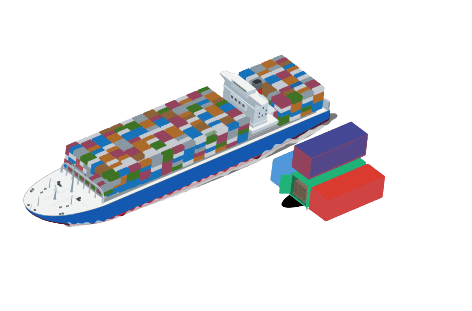In the context of foreign trade, understanding the different types of freight payment is essential for determining responsibilities for the delivery of goods and even reducing costs in import and export operations.
In this article, we will present the main types of international freight payment and their characteristics. Keep reading to get more information about this important aspect of logistics in global trade.
The Main Types of International Freight Payment
Basically, there are three main types of international freight payment, each with its own peculiarities and impact on the costs and responsibilities of the parties involved in commercial operations. They are:
Freight Prepaid
In this payment modality, the exporter assumes responsibility for the shipping costs of the goods and, consequently, the cost of international freight. In other words, the freight is paid in advance by the exporter, usually in the country of shipment, up to a maximum of five days after the cargo’s departure. Prepaid freight is a way to ensure greater security for the exporter since they have control over the payment and can ensure the shipment is made before incurring costs.
Freight Collect
In the case of freight collect, the importer is responsible for the shipping costs of the goods. Thus, the freight is charged in the country of arrival of the cargo, as mentioned in the Bill of Lading. However, it is important to note that this modality is not allowed for the shipment of samples, perishable goods, and live animals.
Freight Payable at Destination
In freight payable at destination, the importer pays the freight upon the arrival of the goods or at the time of their withdrawal. In this modality, the responsibility for payment falls on the importer, who settles the freight with the carrier or logistics operator after receiving the goods.
Relationship between Incoterms and Types of Freight Payment
Incoterms, or International Commercial Terms, play an important role in defining responsibility for freight payment in foreign trade operations. However, it is essential to emphasize that Incoterms specify the responsibilities of the parties involved in operations, while the types of payment indicate when the payment should be made.
In cases where the freight is prepaid, i.e., paid by the exporter, the Incoterms groups that encompass this responsibility are Group C (CFR, CIF, and CPT) and Group D (DDP, DAT, and DPU).
On the other hand, when the freight is collect, i.e., paid by the importer, the Incoterms groups that cover this responsibility are Group E (EXW) and Group F (FCA, FAS, and FOB).
Negotiation and Documentation
The choice of the type of freight payment may depend on various factors, such as internal company policies, relationships with logistics suppliers, and market conditions. Some companies prefer to use prepaid freight to avoid risks and ensure control over operations, while others opt for collect freight to reduce initial costs.
To conduct successful negotiations and obtain the desired type of payment, it is essential to map the main logistics suppliers and request international freight quotations.
Regarding documentation, it is mandatory to specify the type of payment made in the Bill of Lading (BL or AWB) and in the Merchant Shipping CE documentation, Mantra (future CCT), and Import Declaration. Errors or omissions can result in losses and fines imposed by the Federal Revenue.
Conclusion
The types of international freight payment play a crucial role in foreign trade, directly impacting the responsibilities and costs of import and export operations. It is essential for companies to understand the specifics of each modality to choose the one that best suits their logistical and commercial needs. Furthermore, correct negotiations with logistics suppliers and attention to documentary aspects are fundamental to ensuring a smooth and secure operation in the global trade scenario.
What is Cheap2Ship?
Get to know Cheap2Ship, a technology company specializing in logistics and foreign trade. Through our advanced freight management and quoting platform, medium and large companies have experienced significant increases in operational efficiency and reductions in logistics costs.
Our commitment is to provide greater transparency in costs related to current freight providers, such as shipowners, freight forwarders, and carriers. This way, our clients can make more informed and strategic decisions for their businesses.
To learn more about our innovative solutions, visit our website and follow us on social media. There, you will find relevant content about foreign trade, logistics, and the supply chain. We are ready to drive your company’s success in the global market. Join us and discover how we can make a difference for your business.

